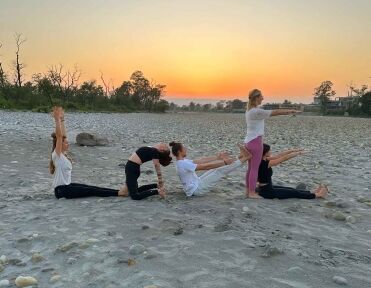
### Ultimately, You Can Only Share What You Understand: The Significance of Experience and Training in Yoga Teaching
Whether your goal is to enhance flexibility, build strength, relieve stress, recover from an injury, or simply achieve a deeper connection with your inner self, yoga presents a multitude of advantages for its practitioners. Nonetheless, the quality and richness of your journey are heavily influenced by the skill set of your yoga instructor. A proficient teacher can customize their guidance to fit your specific requirements. On the other hand, a teacher who does not possess adequate training or experience may hinder your development—or, even worse, lead to possible physical injury.
As the saying suggests, “You can only share what you understand,” and this principle is particularly relevant in yoga. Let’s delve into the importance of your yoga teacher’s training, personal learning, and practice in shaping your yoga experience.
—
### The Significance of Teacher Education
The current landscape of yoga is incredibly varied, encompassing numerous styles and methods. From conventional practices like Hatha and Ashtanga to modern variations such as Vinyasa Flow, Kundalini, Acro yoga, and Yogalates, yoga has transformed into a broad term that includes a diverse array of movement arts and philosophies.
What sets apart an impactful yoga instructor is their foundational education. Most yoga teachers commence their path with a certification program, usually a 200-hour or 500-hour teacher training course recognized by organizations like Yoga Alliance. These programs offer a thorough introduction to anatomy, postures (asanas), breathwork (pranayama), and the philosophy underpinning yoga.
However, not all educational courses are of the same caliber. Some programs focus on traditional yogic principles steeped in ages-old customs from India, while others might adopt modern blends, infusing aspects from practices like Pilates, tai chi, or mindfulness meditation. The style, depth, and caliber of a teacher’s training ultimately determine their ability to guide students both safely and effectively.
When selecting a yoga instructor, it’s beneficial to inquire about their experience. Are they trained in the specific style you wish to explore? Have they pursued further education through workshops or higher-level certifications? Such insights can assist you in matching their expertise with your personal objectives.
—
### Beyond Certification: A Teacher’s Insights and Learning Path
Formal training isn’t the only element that affects a yoga teacher’s impact. Their continuous education significantly contributes to the caliber of their teaching. Many skilled teachers enrich their knowledge through workshops, personal study, and mentorships with more experienced colleagues.
Certain instructors bring unique skills to the practice, drawing knowledge from disciplines like nutrition, Ayurveda, herbal medicine, physical therapy, meditation, or even psychology. This interdisciplinary approach can enhance their teaching, providing students with a more well-rounded experience.
Similarly, instructors dedicated to the craft of yoga frequently dive into its philosophy—exploring sacred writings such as the *Yoga Sutras* of Patanjali, the *Bhagavad Gita*, and the *Hatha Yoga Pradipika*. This profound grasp of yoga’s spiritual and philosophical aspects empowers them to share insights that transcend mere physical movements.
—
### The Impact of Personal Practice
You can frequently gauge how much a teacher treasures their own yoga journey by observing their teaching approach. An effective instructor remains a learner as well, continuously honing their practice and gaining insights from both personal experiences and those of others.
For instance, a teacher who engages in regular practice on their mat might possess valuable perspectives on how different poses feel and function. Their lessons are influenced not only by theoretical understanding but also by real-life experiences. Those who have navigated injuries may focus on safe alignment and provide alternatives. Teachers who explore innovative movement alongside traditional asana might conduct more dynamic, adaptable classes.
A teacher’s personal practice plays a significant role in how they maintain inspiration and authenticity. Indeed, yoga is more than just a practice to master—it’s a lifelong journey of self-discovery, growth, and exploration. By embodying the principles they teach, yoga instructors exemplify the discipline, curiosity, and humility they aspire to instill in their students.
—
### An Excellent Yoga Teacher Is Always Evolving
Perhaps the most defining characteristic of an outstanding yoga instructor is their dedication to lifelong learning. A teacher with years of experience is invaluable, but only if they prioritize keeping up with contemporary developments. Today’s landscape presents educators with numerous avenues for growth—be it through in-person workshops, advanced teacher training, or online resources that connect them with teachers and schools worldwide.
Curiosity is crucial for both mentors and learners. As a student, you have every right to inquire about your teacher’s credentials, lineage, and sources of inspiration. Understanding who trained your teacher, the quality of their education, and the breadth of their ongoing learning will provide you with valuable insight into what you can expect to gain from them.
—
### Selecting the Ideal Teacher for Your Journey
Yoga is a deeply individual practice. What proves beneficial for one person may not resonate with another, which is why choosing the right teacher is essential. A capable instructor should make you feel acknowledged, supported, and appropriately challenged. They should cater to your needs.